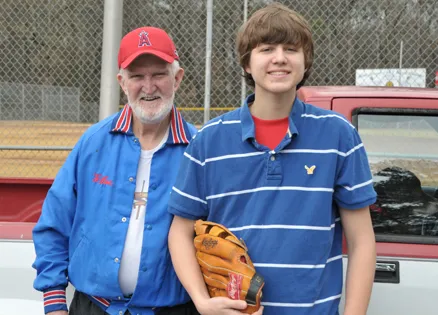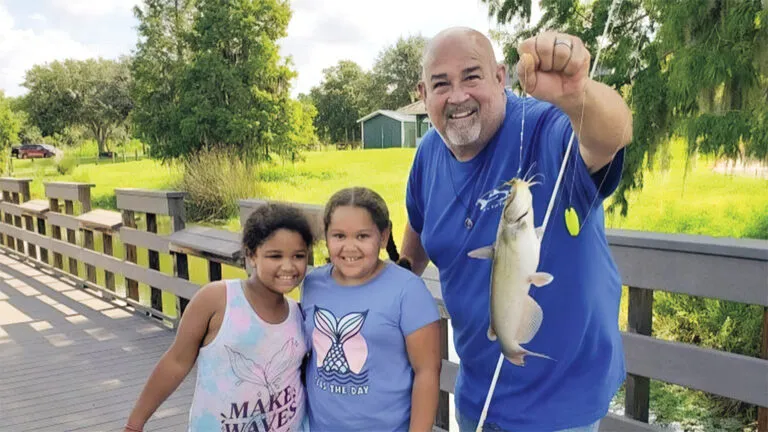Opening day of the East Marietta Little League season I sat in the bleachers overlooking the Sewell Mill Park ball field.
Every spring in Marietta, Georgia, the Little Leaguers dress in their uniforms, gloves and ball caps, pile into pickup trucks and parade down the main strip to the field for the opening ceremony.
Today was extra special—the twentieth anniversary of the 1983 Little League World Series, when the team from Marietta won it all. My 10-year-old, John, sat on his glove in the field next to his teammates, waiting for the men at the podium to speak: 11 of the 14 players on that historic team, including one who’d gone on to pitch for the Chicago Cubs.
But really everything that morning seemed to revolve around the man in the middle, the skipper for that team and many others during his 38 years in Little League, the man my son called his favorite coach, Richard Hilton.
What was it about this man that made him stand out from other coaches? I wondered. “He looks like Santa,” I overheard one of the younger kids say. I laughed. Coach Hilton certainly drew those comparisons with his white hair, white beard and rosy, smiling face.
I’d first met Coach Hilton the year before, when John played on his fall ball team. Everyone had rave reviews. “You know he turned down a promotion at work so he could still coach the kids?” another parent told me. That didn’t surprise me once I saw how good he was with John. The first team Coach Hilton ever managed was his son’s team, and he still treated his players like family.
My son really wanted to play second base. Since he wasn’t a strong fielder, other coaches had stuck him in right field. Coach Hilton played him at second…and gave him extra fielding practice to help him improve his skills. I got used to waiting 15 minutes after practice, watching my son field grounders or take “a few last swings” in the batting cage.
Coach Hilton cared about the boys off the field too. One afternoon last fall I found John at the table doing his homework before practice—without nagging from me. I must have looked startled because John said, “Coach says we should get our schoolwork done before we play ball.”
It wasn’t just about winning to Coach Hilton. But that alone couldn’t account for the love and respect people had for him. What set him apart?
The ceremony began. One by one, the former players shared stories from that magical season. Back then, the boys had to win 14 games in a row to take home the Little League World Series title (today, a round-robin tournament means a team can lose and still advance if they win their other games).
But what really amazed me was how successful they’d gone on to be. They’d become presidents of companies, managers, police officers, doctors, teachers. Each one credited their coach as a role model. The pitcher for the Cubs? He’d come back to Marietta and, inspired by Coach Hilton, he had signed up to coach one of the Little League teams himself.
I saw John sitting on the field, listening closely, enthralled.
The ceremony ended, and John and I headed home to relax before returning for practice in a few hours. “I think I want to coach someday,” John told me as we walked to the car. Was that what made a truly great coach? Someone who inspires others to follow their path?
John couldn’t stop talking about all the former players until it was almost time to drive back to the field. He went to get his things. Why was he taking so long? “We’re going to be late,” I called, walking down the hall to his room. John was rifling through his closet. He looked up at me, clearly upset. “My glove,” he said. “I can’t find it.”
We searched the whole house. No luck. “Maybe you left it at the field,” I said. “We’ll look for it there.” John got into the car, but he wasn’t happy. Neither was I. No way that glove is still there all these hours later, I thought. First day of practice, and no glove. A sad way to start the season.
We pulled into the parking lot. I was surprised to see Coach Hilton’s red-and-white truck. What was he doing here? I waved at him. “I thought you’d be out celebrating,” I said.
“Well, I was going to,” he said. “But I couldn’t let one of my Little Leaguers practice without this.”
He pulled a worn leather glove from his truck. John’s glove.
There I had it—the answer to my question. What makes a great coach? Putting other people first, leading with love. In Little League or in life, it’s those little kindnesses that make someone a champion. Great coaches are more than just coaches—they are great leaders.
“Thank you!” John said. He bounded off toward the field. I couldn’t tell who was happier—my son or his favorite coach.





